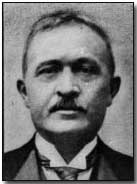Who's Who - Rene Viviani
 Rene Viviani (1862-1925) served, for a
brief time, as premier of France when war broke out in 1914.
Rene Viviani (1862-1925) served, for a
brief time, as premier of France when war broke out in 1914.
Born in Algeria on 8 November 1863, Viviani spent his early years working as a lawyer in Algiers before coming to France where he specialised in defending the rights of socialists and trade union workers.
In 1893 Viviani was elected to the Chamber of Deputies, where he worked with Jean Jaures and Aristide Briand in establishing the French Socialist Party. A moderate left-wing socialist, Viviani co-founded L'Humanite, a socialist newspaper, in 1904.
Both Viviani and Briand left the Socialist Party two years later, in 1906, in order to enter Clemenceau's government, where Viviani took up a position as Minister of Labour, remaining in office until November 1910 once Briand took up the premiership in 1909.
Viviani returned to office as Minister of Education in December 1913 before being asked by President Poincare to form a government in June 1914, which he succeeded in doing at the second attempt. He himself served initially as Foreign Minister.
At the time of Archduke Franz Ferdinand's assassination in Sarajevo on 28 June, Viviani and Poincare were cruising aboard the battleship France en route for a state visit to Russia.
Once news of the murder and its ramifications filtered through, Viviani invariably chose to defer to Poincare's political opinion, agreeing to his recommendation in August to form a wartime coalition government.
In military matters Viviani similarly preferred to leave matters largely to the Commander in Chief, Joseph Joffre, much to the latter's satisfaction (who proceeded to progressively exclude French politicians from what he called "the zone of the armies").
Viviani's government did subsequently attempt to assert its authority over Joffre, with a singular lack of success. In early 1915 a major parliamentary row brewed over the government's inability to force Joffre to accept government inspections of the Western Front. Similarly, while Viviani favoured providing military assistance to Serbia he was largely frustrated in this by Joffre's reluctance to divert resources from the French front.
However, once the dust had begun to settle upon the initial French and Allied setbacks of the war, particularly in 1915, it was Viviani who was called upon the resign, as reports of French munition shortages increased in number.
When Bulgaria came out in support of the Central Powers in September 1915, despite the best efforts of Viviani's Foreign Minister Delcasse, Viviani chose to resign the following month, and was replaced by the returning Aristide Briand. He retained a cabinet post as Minister for Justice but never made much further impact upon government policy.
After the war, Viviani took up an appointment as French representative at the League of Nations. He again represented France at the Washington Naval Conference in 1921, and entered the French Senate in 1922, but played no further part in politics.
Rene Viviani died in Le Plessis-Robinson on 7 September 1925 at the age of 61.
In preparation for the Battle of the Somme, the British launched a seven-day artillery bombardment in which 1,500 guns fired 1.6 million rounds.
- Did you know?
